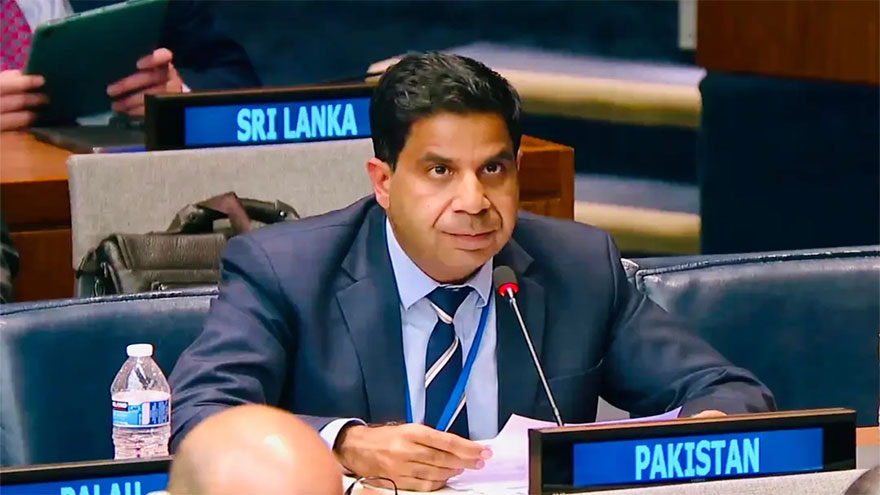Listen to the article
Pakistan has expressed serious concern at the United Nations over the strategic manipulation of information by occupying powers, calling for international action to combat disinformation and protect the right to accurate information.
Speaking before the UN General Assembly’s Fourth Committee on Questions relating to Information, Pakistani delegate Amanat Ali highlighted how occupying powers use sophisticated methods to conceal human rights abuses and delegitimize self-determination movements.
“Through internet shutdowns, restrictive media laws, and digital surveillance, these powers seek to silence dissent and manufacture a false narrative of stability,” said Ali, who serves as press counsellor at Pakistan’s UN Mission. He emphasized that such systemic information repression violates international law and undermines member states’ moral responsibilities.
The Pakistani representative warned that deliberate distortion of facts has become systematic, with serious implications for global trust and multilateral cooperation. “Where information should serve humanity and foster understanding, its misuse corrodes public trust, sows polarization, and weakens multilateral cooperation,” Ali stated.
Pakistan’s intervention comes amid growing global concern about digital authoritarianism, where governments restrict internet access and monitor online activities to control populations and narrative. Recent reports from international human rights organizations have documented increasing cases of internet shutdowns in conflict zones and occupied territories, affecting millions of people’s access to critical information.
Ali highlighted the dual nature of emerging technologies like artificial intelligence, noting that while these tools could strengthen governance when ethically guided, they also risk becoming powerful weapons of deception when misused. “Left unchecked, these tools can magnify lies with impunity,” he cautioned.
The digital divide received particular attention in Pakistan’s address, with Ali noting that without equitable access to information technologies, large segments of humanity remain excluded from digital opportunities. He linked bridging this divide directly to achieving the UN’s 2030 Agenda for Sustainable Development, emphasizing that technological disparity threatens global development goals.
Pakistan also called attention to the global rise in hate speech, particularly Islamophobia and xenophobia, which frequently results in real-world harm to vulnerable communities. Ali urged stronger international action, including better platform governance and sustained UN advocacy for pluralism and tolerance.
The statement reinforced Pakistan’s position that information should be viewed not merely as a commodity but as a public good and a shared responsibility. Ali stressed that timely and impartial dissemination of information is essential to promoting the UN’s principles and initiatives, achievable only through maintaining accuracy and integrity in information sharing.
Climate misinformation also featured in Pakistan’s concerns, with Ali pointing to false narratives about environmental issues circulating on global platforms. This emphasis reflects Pakistan’s own vulnerability to climate change impacts, having experienced devastating floods in 2022 that affected over 33 million people and caused economic damage exceeding $30 billion.
Pakistan reaffirmed its support for the UN Department of Global Communications (DGC) in its efforts to create a more tolerant, just, and accountable global information ecosystem. “Only through informed societies can we sustainably combat the scourge of disinformation,” Ali concluded.
The statement comes at a time when the UN itself is placing increased emphasis on combating disinformation and ensuring access to reliable information as crucial elements in maintaining international peace and security. Secretary-General António Guterres has previously described the spread of misinformation as one of the key challenges facing the international community in the digital age.
Fact Checker
Verify the accuracy of this article using The Disinformation Commission analysis and real-time sources.




10 Comments
This highlights the complex relationship between information, power, and human rights. Occupying forces using digital tools to repress dissent and control the narrative is a disturbing development.
You make a good point. Information can be a powerful weapon, and we’ve seen how it can be weaponized to violate rights and undermine democracy. Combating this will require a multifaceted approach.
Pakistan is right to raise this issue at the UN. Combating disinformation used to conceal human rights abuses is essential for protecting the principles of self-determination and multilateral cooperation.
Pakistan is right to sound the alarm on this issue. Disinformation campaigns that cover up human rights abuses must be confronted head-on through robust international cooperation and mechanisms to uphold the truth.
Pakistan is right to raise this issue at the UN. The strategic manipulation of information by occupying powers to justify their actions is a worrying global trend that requires a coordinated international response.
Absolutely. Disinformation undermines the principles of transparency and accountability that are essential for effective multilateral cooperation. The UN must take strong measures to uphold the integrity of information.
This is a concerning issue that goes to the heart of upholding human rights and the free flow of information. Disinformation campaigns used to cover up abuses are a serious threat to global stability and cooperation.
I agree, the misuse of information to stifle dissent and conceal wrongdoing is extremely troubling. Robust action is needed to combat these tactics and protect the public’s right to the truth.
This is a challenging problem without easy solutions. But the UN must take decisive action to protect the free flow of information and prevent occupying powers from distorting facts to justify their actions.
I agree, the stakes are high. Upholding transparency and the integrity of information is crucial for maintaining global peace and security. The UN has a responsibility to lead the way in addressing this threat.